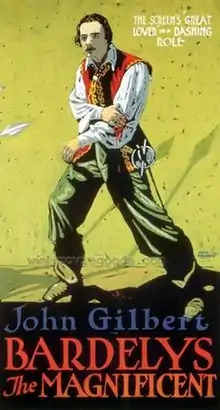Bardelys the Magnificent
Bardelys the Magnificent is a 1926 American romantic silent film directed by King Vidor and starring John Gilbert and Eleanor Boardman. The film is based on the 1906 novel of the same title by Rafael Sabatini.[1] It was the second film of the 19-year-old John Wayne, who had a minor role.
| Bardelys the Magnificent | |
|---|---|
 Theatrical release poster | |
| Directed by | King Vidor |
| Written by | Dorothy Farnum |
| Based on | Bardelys the Magnificent by Rafael Sabatini |
| Starring | |
| Music by | William Axt |
| Cinematography | William H. Daniels |
| Distributed by | Metro-Goldwyn-Mayer |
Release date |
|
Running time | 90 minutes |
| Country | United States |
| Language |
|
The film's sets were designed by the art director James Basevi.
Plot
The film is set in the reign of King Louis XIII. When Comte Châtellerault fails to win the hand in marriage of Roxalanne de Lavedan, despite hinting at leniency for her rebellious family if she accepts, he responds to the notorious womanizer Marquis de Bardelys' mockery by wagering his estate against that of Bardelys that Bardelys cannot succeed in marrying Roxalanne either within three months. While Bardelys does not desire marriage, he feels he has to accept the challenge. However the king, on hearing of the wager, forbids Bardelys from seeking a marriage alliance with a rebel family.
Bardelys ignores the king’s orders as he feels that his honour is at stake. On the way to the Lavedan estate, he stumbles upon a fatally wounded man, Lesperon, who asks him to say farewell to his beloved but dies before telling him her name. Bardelys takes his papers and, when challenged by a party of the king’s soldiers, assumes Lesperon’s identity to conceal his own, only to find that Lesperon is a wanted traitor. Bardelys escapes after fighting them off, and wounded, seeks refuge in the Lavedan residence. Roxalanne tends to him and hides him. Meanwhile, Roxalanne and her family discover with anger that she is the subject of a public wager by Bardelys, who prudently retains his assumed identity and grows closer to Roxalanne.
They declare their love for one another but she discovers that Lesperon was engaged and, furious at what she thinks are his false protestations of love, denounces Bardelys to soldiers. Bardelys, under the identity of Lesperon, is tried for treason. Châtellerault, who is the head judge, maliciously refuses to confirm his true identity and condemns him to death.
Roxalanne, still in love with Bardelys and guilty at causing his imminent death, marries Châtellerault on his promise to remit the sentence, but he breaks his word. Bardelys, on the gallows, delays his execution until the king arrives and saves him. Bardelys goes to Châtellerault and forfeits the wager and his estate so he can propose to Roxalanne with a clear conscience. The two men fight and Bardelys repeatedly wins, when soldiers enter to arrest Châtellerault upon which he kills himself rather than suffer the indignity of a trial. The king enters to laud Bardelys’ skill with women to Roxalanne’s annoyance but she is mollified when the king says that this is the first time Bardelys has sought to marry.
Preservation status
The film was considered a lost film for many years, with only the trailer and a brief excerpt in Vidor's Show People (1928) surviving. According to Robert Osborne on Turner Classic Movies, MGM signed a contract with Sabatini in 1926, giving MGM the rights to his novel for 10 years. In 1936, MGM chose not to renew the rights, and destroyed the negative and all known prints per the terms of the contract.
In 2006, a nearly complete print of the film was found in France, missing only reel three.[2] It was restored, using production stills and footage from the film trailer to stand in for the missing section, and made available in 2008 for U. S. theatrical and DVD release. In February 2020, the film was shown at the 70th Berlin International Film Festival, as part of a retrospective dedicated to King Vidor's career.[3]
Cast

- John Gilbert as Marquis Bardelys
- Eleanor Boardman as Roxalanne de Lavedan
- Roy D'Arcy as Comte Châtellerault
- Lionel Belmore as Vicomte de Lavedan
- Emily Fitzroy as Vicomtesse de Lavedan
- George K. Arthur as Sainte-Eustache
- Arthur Lubin as King Louis XIII
- Theodore von Eltz as Lesperon
- Karl Dane as Rodenard
- Edward Connelly as Cardinal Richelieu
- Fred Malatesta as Castelrous
- John T. Murray as Lafosse
- Joe Smith Marba as Innkeeper (as Joseph Marba)
- Daniel G. Tomlinson as Sergeant of Dragoons
- Emile Chautard as Anatol
- John Wayne as Guard (uncredited)
- Lou Costello as Extra (uncredited)
- Joan Crawford as Court Gossip (Uncredited)[4]
References
- Variety Film Review. October 13, 1926, page 20.
- "Progressive Silent Film List: Bardelys the Magnificent". Silent Era. Retrieved June 4, 2009.
- "Berlinale 2020: Retrospective "King Vidor"". Berlinale. Retrieved February 28, 2020.
- "Bardelys the Magnificent (1926), Full Cast & Crew". Internet Movie Database (IMDb), a subsidiary of Amazon.com, Seattle, Washington. Retrieved November 27, 2017.